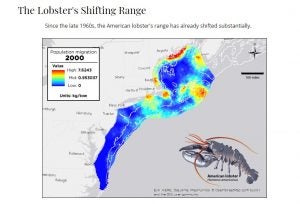
Climate change continues to impact the environment on a global and local level, influencing society in ways we may not even realize. In Rhode Island, climate change is altering the fishing industry through lobster migration.
Climate change continues to impact the environment on a global and local level, influencing society in ways we may not even realize. In Rhode Island, climate change is altering the fishing industry through lobster migration.
Climate change continues to impact the environment on a global and local level, influencing society in ways we may not even realize. According to NOAA, “the United States is 1.8 degrees warmer than it was a century ago” (Carter 2019). In Rhode Island, climate change is altering the fishing industry through lobster migration. As water temperatures rise, the lobster population moves farther north to find a cooler habitat. This movement puts an immense strain on Rhode Island’s lobster industry as the local population continues to dwindle. However, some fishermen see it as an opportunity to focus on a different industry.
For instance, while rising temperatures may negatively impact the lobster industry, they may at the same time positively impact the squid industry. Squid are better suited to warmer temperatures, potentially creating an increase in their population in Rhode Island would.
Rhode Island fishermen are being forced to adapt not only in what they catch, but also in when then can catch it, since climate change is causing harsher and more intense weather and storms. It is becoming more and more difficult to predict when a storm will strike, and how severe it may be.
The fisherman are hopeful that they can adapt to these environmental changes, however, climate change will continue to warm the waters and eventually push the lobster population even farther north.
